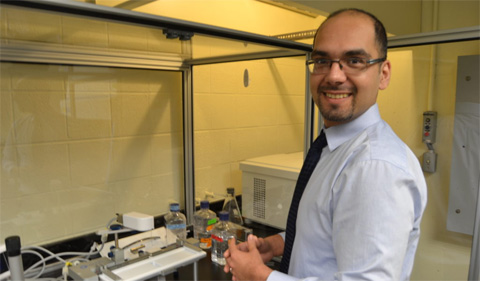
Amir Farnoud in his laboratory in Stocker Center.
By Raymond Humienny
NQPI editorial intern
Ohio University’s Chemical and Biomolecular Engineering professor and the Nanoscale & Quantum Phenomena Institute’s newest member Amir Farnoud has spent the past 13 years molding his ideal research career in bioscience.
“I thought, ‘You know, if I do something that will someday lead to a drug that will save someone’s life – if I have one of these in a 30- or 40-year career of research – then that’s all I really want to do,’” Farnoud said.
Nominated by Dr. Eric Stinaff, Associate Professor of Physics & Astronomy, on September 27, 2016, Farnoud was approved as a member of NQPI on October 13, 2016. With only three months’ membership spanning over a holiday break, Farnoud said that he has had little time to interact with other NQPI personnel.
“It just helps to have a bunch of researchers together with the same interest,” Farnoud said. “It can never hurt you.”
Farnoud earned a bachelor’s degree in 2005 studying chemical engineering at Tehran University. Hospitalization turned his interests toward bioscience, said Faround, then deciding to pursue a master’s degree in biotechnology at Tarbiat Modares University.
After completing his master’s in 2007, he moved to the United States to continue higher education at the University of Iowa, finishing a Ph.D. in chemical and biochemical engineering and research on inhalable nanoparticle drug delivery in 2013.
During his education in Iowa, Farnoud observed how changes in the physical properties of these particles would affect lung (pulmonary) surfactant function. Pulmonary surfactants are combinations of proteins and lipids designed to decrease surface tension in alveoli at the air-liquid interface, a fundamental component of healthy respiration.
“Preterm infants are born without lung surfactants, and if you don’t have surfactants and you can’t open up your lungs, your lungs will collapse,” Farnoud said. “Those infants are given calf lung surfactant. What we wanted to do was make sure that these particles would not affect surfactant function, so essentially you’re not turning an adult to a preterm infant while trying to treat a disease.”
Farnoud expanded upon nanoscale pulmonary research during post-doctoral work in 2013 at Stony Brook University in New York. By investigating cell membrane characteristics of Cryptococcus neoformans (C. neoformans), a pulmonary fungal pathogen that hides in macrophages of immunocompetent individuals and causes meningitis, Farnoud worked on developing a mutant to affect the pathogen’s virulence properties.
“(We looked) at the chemical structures of glucosylceramide, how changes in that structure will affect whether or not the fungus can cause virulence in mice models,” Farnoud said. “The thing is if the fungus can’t produce this one lipid, it can’t kill mice. We’re still trying to figure out what’s so important about this one lipid.”
Amir began teaching at Ohio University in 2015, incorporating his current research with his classes. Such endeavors include nanoparticle-biomembrane interactions, drug delivery for fungal infections and nanoparticle-protein interactions. Currently, Farnoud said he is focusing on the former-most item in dealing with hookah and e-cigarette smoke on lung surfactant function.
“This goes back to my Ph.D. research because every time I present on my Ph.D. research, someone asks me about tobacco smoke,” Farnoud said. “If you add a lot of nicotine to your lung surfactant, nothing happens; but if you add e-cigarette smoke, surfactant function changes, so there is something in there that is not nicotine that is doing something.”
In the meantime, Farnoud said he has enjoyed teaching and being able to be a part of helping students grow.
“The way I think about it is that research is kind of the long-term satisfaction, whereas teaching is kind of the short-term satisfaction,” Farnoud said. “You see people coming in as kids and going out as engineers, so that is very rewarding.”
Amir also understands that all work and no play makes Jack a dull boy. Once a 2012 state champion in chess at the University of Iowa, Farnoud said he has begun training again this academic year.
“I look forward to playing with chess players here,” Farnoud said. “It helps with keeping you sane as well.”



















Comments